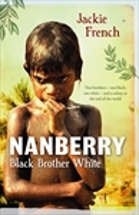Nanberry: Black Brother White by Jackie French

Angus and Robertson, 2011. ISBN: 978 0 7322 9022 1.
Highly recommended. From a blissful childhood, where food is
plentiful and family life happy and filled with ease, Nanberry's
life changes with the arrival of 'ghost canoes' and white people.
With them come white people's diseases, to which the aboriginal
communities have no immunity and the young boy sees his immediate
family struck down with smallpox. When the Governor and Surgeon
White go to investigate the deaths, Nanberry is discovered and taken
to the hospital where he is cared for and fed. As the child is
returned to health, and shows an aptitude to quickly learn English
words and ways, the Surgeon decides to adopt him. He takes the boy
home where his maid is expected to care for both Nanberry and the
o'possum which the Doctor has also found. This is the beginning of a
strange little family, which grows and changes over time, and the
life of each of the characters as they straddle the boundaries
between the worlds of the aboriginals, convicts and the English free
settlers.
French is a prolific author, whose novels are not only easily
devoured but quality literature, often challenging the reader to
think more deeply on her chosen topics. This title is no exception.
The killings of the aboriginal people, the relationships between
Masters and servants, English and aboriginals, the inhumane
treatment of the convicts onboard the ships to Australia and the
treatment (or mistreatment) of the land are amongst the topics
covered without being sanitised. Themes of family, loyalty, honour
and the value of hard work are all included, with the title being
based on the concept of belonging. Nanberry reflects on changes he
notes in himself as he muses, 'Black brother. White father.' Based
on actual characters of the time, one can well believe this dilemma
of being 'stranded between two cultures and at times earning
contempt from both' (author's notes) as being true not only of
Bennelong but also of Nanberry.
This title would work well as a comparative text for secondary
students, alongside Geraldine Brooks' Caleb's Crossing.
Jo Schenkel